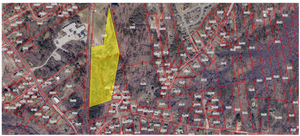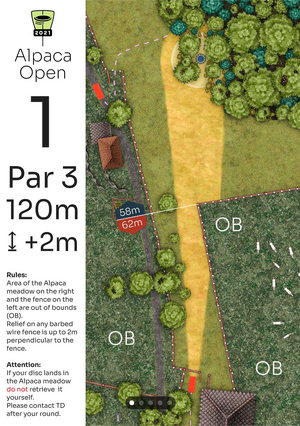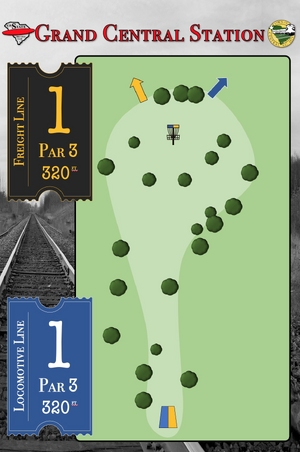Who is the sponsor for the course? A town Rec Department? A local school? Regardless of who you are working with, you have to expect that not everyone is going to be an avid disc golfer and know every last detail about the sport, conventions, and considerations. Therefore, its helpful to outline and discuss even the small details that would make course development a success[1].
Site Planning

It almost goes without saying that one of the first things you have to do is identify where the course is going to be built. It may seem obvious ("we're going to build it right here"), until you get into the details of construction and layout, conservation approval and more. Your town or state probably has a GIS system that will show property / tax boundaries that help in defining the abutter's property.
Software

Hole maps / Teepad signs
Given a "canvas" on which to draw a course layout, the actual process of depicting teepads, paths, baskets, OB, etc. can sometimes be done in creative ways. The example here was done with Inkarnate - online software for mapping fantasy worlds.

You can even do signage in PowerPoint
Course maps
While a teepad sign can be highly abstract, the actual full course map needs to be done precisely. There is the whole category of Geographic information system (GIS) software. Your local environmental engineer, town planning department, regional land use planning agency, or conservation commission may use one system in particular, but there are many. The ArcGIS system by ESRI is one of the most widely used. The problem with the commercial software systems - besides being too complex for casual use - is that they are not available for personal use or prohibitively expensive. QGIS (formerly Quantum GIS - see wp:QGIS) is a spatial visualization and decision-making tool that is completely free software. Still, it is powerful and complex software, so not something to fire up without some training. This 4+ hour tutorial is for beginners. Without diving into it further, the high-level process is to record a GPS track (e.g. using a phone app) while you walk the course and tag locations called 'waypoints'. Of course you simultaneously mark the ground while you're on site. Then, you download and work with your data in QGIS on the computer to map out the markings you made in the field. For disc golf - which is traditionally played in heavily wooded areas - it is impossible to map a course from just aerial or satellite imagery due to tree canopy.
"Free to use" options like Google Earth or "My Maps" from Google Maps can be used, but have limitations and drawbacks. OpenStreetMap (OSM) (example) is the go-to free competitor to Google Maps. OSM; used by TomTom, Apple, Microsoft, Esri and others, is judged to be one of the most successful collaboratively maintained open datasets in existence[2]. Aside: one of the beautiful things about OSM is that the data design of the system makes it so that you can literally map things like "Massachusetts Route 110", and use tools like wp:OsmAnd to navigate that route - something which is impossible to do with Google Maps, or even paid apps like Rever for motorcyclists[3].
Using OpenStreetMaps to design a Disc Golf Course is a subject worth a deeper dive.
Other possible tools
- https://www.photopea.com/ - online PhotoShop workalike
- inkscape - vector drawing tool
References
- ↑ Here is some advice during the development of the Weare-Merriman course in Seabrook, NH
- ↑ Dodds, Leigh; Yates, Deborah (14 August 2018). "How Facebook, Apple and Microsoft are contributing to an openly licensed map of the world". London: Open Data Institute. Retrieved 12 September 2024.
- ↑ When I planned a motorcycle ride out to Maple Hill for the 2024 MVP Open, I wanted to avoid the highway. I figured "Hey, why not just ride MA 110 since it goes most of the way and I'll get a chance to ride back in time to get a glimpse of the communities along the road before Route 495 existed. It was impossible to do without OsmAnd.